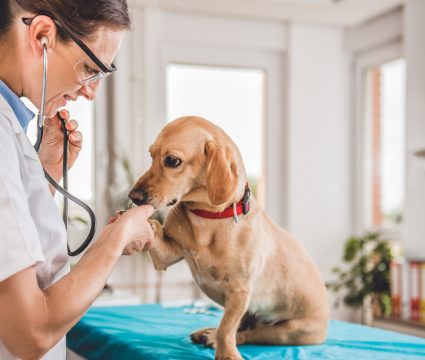You can’t go online or turn on the TV these days without being bombarded with information about the coronavirus pandemic.
We don’t want to unnecessarily contribute to this kind of information overload, but we think it is important that readers understand how the virus may affect your dog and the manner in which you care for him.
Below, we’ll explain the current information available about COVID-19 and dogs to help you keep your four-footed family members safe. Just understand that this is a fluid situation, and new information is being made available frequently, so we’ll update this as circumstances warrant.
Most recent update: May 26th, 2020.
Coronavirus and Dogs: Key Takeaways
- Researchers have determined that two dogs in China have become infected with SARS-CoV-2.
- The two dogs known to have been infected with SARS-CoV-2 remained asymptomatic during their quarantine period.
- Most authorities are urging common-sense hygiene measures when caring for your dog, such as not sharing dishes and washing your hands after contacting your pet.
Coronavirus Basics
We’ll share what we know about dogs and the coronavirus below, but first, let’s make sure everyone is on the same page regarding some of the relevant terminologies:
Coronavirus
Coronaviruses are a group of viruses that cause illness in birds and mammals (including humans and dogs). Many coronaviruses only cause mild illness; several strains of the common cold are coronaviruses.
However, new or novel strains – such as SARS (severe acute respiratory syndrome) and MERS (Middle East respiratory syndrome) — pop up from time to time and are capable of causing serious illness.
SARS-CoV-2
SARS-CoV-2 is the name of the virus that causes COVID-19.
COVID-19
COVID-19 is the name of the disease in humans caused by SARS-CoV-2. It stands for coronavirus disease 2019.
Can Dogs Get the Coronavirus?
Despite earlier comments provided by some researchers, it now appears that dogs can become infected by SARS-CoV-2.
According to a new report, published on May 14th in the journal Nature, researchers have confirmed that two dogs have been infected with SARS-CoV-2.
Both dogs — a 17-year-old Pomeranian and a 2.5-year-old German shepherd — lived with people suffering from COVID-19, and they presumably contracted it from their owners or other family members.
This new information stands in contrast to previous reports, which could not determine if the dogs were actually infected or simply contaminated with small amounts of viral RNA.
Nevertheless, researchers report that both dogs remained asymptomatic for the duration of the quarantine period to which they were subjected.
Can Dogs Transmit Coronavirus to Humans?
Although scientists are still learning a great deal about the virus, researchers agree that while you may be able to transmit the virus to your pet, there is currently no evidence that dogs (or cats) can infect other animals – including humans – with SARS-CoV-2.
Nevertheless, authorities point out that dogs can transmit a variety of pathogens to people, regardless of whether or not they can transmit SARS-CoV-2.
So, they continue to encourage owners to practice good hygiene. Don’t kiss your dog, don’t share dishes, food, or water with your pet, and be sure to wash your hands after contact.
The AKC is also recommending that owners consider using booties or paw wipes to help reduce the chances of spreading all germs.
Can Humans Transmit Coronavirus to Dogs?
Because it now appears that humans can transmit SARS-CoV-2 to their pets, caution is warranted. If you are suffering from COVID-19, you need to do everything you can to avoid spreading the infection to your dog or other people.
This means you’ll want to do all of the things you’ve been reading about and hearing over the last few days, such as isolating yourself and washing your hands frequently. You can find the CDC’s complete recommendations here.
We do not yet know how common human-to-dog transmission is. Accordingly, and out of “an abundance of caution,” the AVMA is recommending that infected people employ a few commonsense measures regarding their pets:
- Notifying your doctor or healthcare professional that you have a dog in the home
- Limit contact with animals until more information about transmission is available
- Have a non-infected friend or family member care for your pet if possible
- If you have to continue to take care of your pet, wear a mask if possible, avoid kissing, hugging, or sharing dishes with your pet, and wash your hands before and after contacting your dog
Some experts recommend that infected individuals restrict contact with their pets to:
“avoid exposing the pets and to prevent getting the virus on their skin or fur, which might be passed on to another person who touches the animal.”
Additionally, Urbana-Champaign’s College of Veterinary Medicine suggests that it is possible dogs could serve as a conduit by which infections are spread, stating that:
“It is possible that a person with COVID-19 could sneeze or otherwise contaminate their pet, and then another individual could touch that animal and contract the disease.”
However, they do go on to state that “Veterinary experts believe the risk for transmission would be low.”
Nevertheless, it is important that you still ensure that your pet’s basic needs are met, even if you get sick. You may just need to enlist the help of a friend or family member, to make sure that your pet still gets fed, watered, walked, and loved while you’re recovering.
Nevertheless, it is important that you still ensure that your pet’s basic needs are met, even if you get sick.
You may just need to enlist the help of a friend or family member, to make sure that your pet still gets fed, watered, walked, and loved while you’re recovering.
Canine Coronaviruses
Dogs can become infected with other coronavirus strains, so it isn’t terribly surprising that they now seem susceptible to SARS-CoV-2.
At least two coronaviruses — CRCoV and CCoV — can sicken dogs.
CRCoV is pretty rare, and it typically causes respiratory symptoms, including coughing, sneezing, and nasal discharge. CCoV, on the other hand, is a diarrheal illness, which is a bit more common.
There is no vaccine or medication to treat CRCoV, so most veterinarians simply provide supportive care to dogs who become infected with the virus. Most dogs who come down with this virus recover on their own in a few weeks.
There is, however, a vaccine that protects dogs from getting CCoV. Just discuss the issue with your vet to determine whether or not your dog is likely to benefit from it.
Coronavirus and Cats
Dogs don’t appear to be the only animals susceptible to the virus; it also appears capable of infecting cats too.
On April 22nd, the USDA and CDC reported that two cats have tested positive for the virus. These are the first two pets in the U.S. who have tested positive. One of the cats lives in a household with a COVID-19-positive owner; the other lives in a home in which no family members have tested positive.
A few weeks ago, the Bronx Zoo reported that five tigers and three lions have also tested positive for the virus.
All of the infected cats — including the pets and zoo animals — are expected to recover completely. The Bronx Zoo reported that all eight infected animals are behaving normally and those who’d suffered from coughing have been doing so less in recent days.
None of the zoos other — and in many cases rarer — cats have demonstrated signs of illness.
***
As we continue to learn more about how this disease may affect dogs, most authorities are encouraging dog owners to exercise the same common-sense hygiene practices when interacting with dogs that they always recommend.
We wish all of our readers and their pets well during this time, and we’ll continue to share new information about the issue of coronavirus and dogs as it becomes available.









1 Comment
September 15, 2020
Very interesting information. Thank you for the article. I read a lot of information that animals can get coronavirus, and I also read that dogs can be carriers of this disease. I am very worried about my dog and I am worried that there is very little official information. I, my family and my dogs try to follow standard hygiene rules to reduce the risk of contracting the disease.